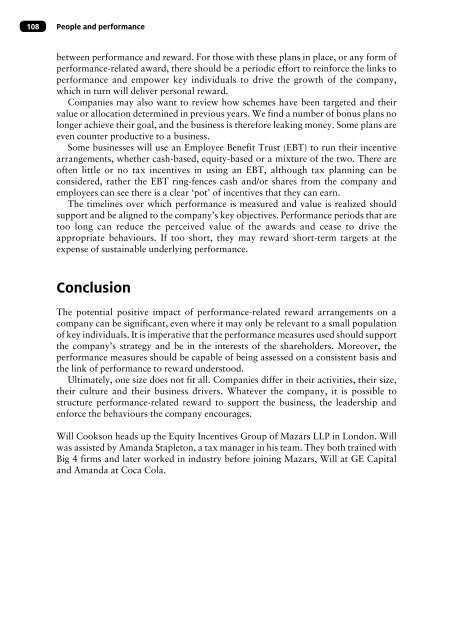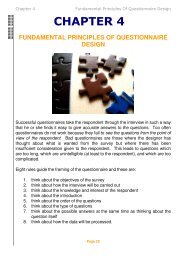The growing business handbook : inspiration and advice ... - Sparkler
The growing business handbook : inspiration and advice ... - Sparkler
The growing business handbook : inspiration and advice ... - Sparkler
Create successful ePaper yourself
Turn your PDF publications into a flip-book with our unique Google optimized e-Paper software.
108 People <strong>and</strong> performance<br />
between performance <strong>and</strong> reward. For those with these plans in place, or any form of<br />
performance-related award, there should be a periodic effort to reinforce the links to<br />
performance <strong>and</strong> empower key individuals to drive the growth of the company,<br />
which in turn will deliver personal reward.<br />
Companies may also want to review how schemes have been targeted <strong>and</strong> their<br />
value or allocation determined in previous years. We find a number of bonus plans no<br />
longer achieve their goal, <strong>and</strong> the <strong>business</strong> is therefore leaking money. Some plans are<br />
even counter productive to a <strong>business</strong>.<br />
Some <strong>business</strong>es will use an Employee Benefit Trust (EBT) to run their incentive<br />
arrangements, whether cash-based, equity-based or a mixture of the two. <strong>The</strong>re are<br />
often little or no tax incentives in using an EBT, although tax planning can be<br />
considered, rather the EBT ring-fences cash <strong>and</strong>/or shares from the company <strong>and</strong><br />
employees can see there is a clear ‘pot’ of incentives that they can earn.<br />
<strong>The</strong> timelines over which performance is measured <strong>and</strong> value is realized should<br />
support <strong>and</strong> be aligned to the company’s key objectives. Performance periods that are<br />
too long can reduce the perceived value of the awards <strong>and</strong> cease to drive the<br />
appropriate behaviours. If too short, they may reward short-term targets at the<br />
expense of sustainable underlying performance.<br />
Conclusion<br />
<strong>The</strong> potential positive impact of performance-related reward arrangements on a<br />
company can be significant, even where it may only be relevant to a small population<br />
of key individuals. It is imperative that the performance measures used should support<br />
the company’s strategy <strong>and</strong> be in the interests of the shareholders. Moreover, the<br />
performance measures should be capable of being assessed on a consistent basis <strong>and</strong><br />
the link of performance to reward understood.<br />
Ultimately, one size does not fit all. Companies differ in their activities, their size,<br />
their culture <strong>and</strong> their <strong>business</strong> drivers. Whatever the company, it is possible to<br />
structure performance-related reward to support the <strong>business</strong>, the leadership <strong>and</strong><br />
enforce the behaviours the company encourages.<br />
Will Cookson heads up the Equity Incentives Group of Mazars LLP in London. Will<br />
was assisted by Am<strong>and</strong>a Stapleton, a tax manager in his team. <strong>The</strong>y both trained with<br />
Big 4 firms <strong>and</strong> later worked in industry before joining Mazars, Will at GE Capital<br />
<strong>and</strong> Am<strong>and</strong>a at Coca Cola.








